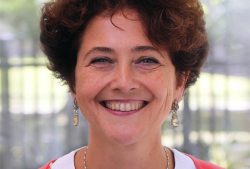“Today is a great day for European science,” said Patrick Cramer, Chair of EMBL Council. “I am extremely pleased with the comprehensive search for the next Director General conducted by the search committee. The committee, composed of leading scientists and science managers from 11 countries, unanimously chose Edith Heard. Edith is an outstanding molecular biologist and scientific leader with a lot of international experience. Her clear scientific vision, her participatory leadership style, and her engagement at all levels of research, service and training make her a perfect choice. Under the leadership of the current Director General, Iain Mattaj, EMBL has advanced to become a world-renowned institution. Today we send out a clear signal that we will stay on this path and develop EMBL as a model for research and services for the future.”
“Edith Heard is an excellent choice to be my successor,” said EMBL Director General Iain Mattaj. “Edith has enormous credibility as a leading scientist in Europe and worldwide. Her experience in developmental and cell biology and genomics make her a perfect scientific fit for EMBL. She is also an accomplished leader with a strong European vision. While at the Institut Curie, Edith has demonstrated her ability to choose and mentor excellent junior group leaders. I have every confidence in her ability to steer EMBL towards future success. I look forward to working with her during the transition.”
 |
| Edith Heard, next Director General |
Professor Heard is currently Director of the Genetics and Developmental Biology Unit at Institut Curie and holds the chair of Epigenetics and Cellular Memory at the College de France. Heard studied Natural Sciences at Emmanuel College, Cambridge University, before going on to complete a PhD in cancer research at the Imperial Cancer Research Fund in London. Since then she has worked at the Institut Pasteur (Paris), Cold Spring Harbor Laboratory (NY, USA) and the Institut Curie (Paris).
Heard’s areas of research include epigenetics and developmental biology and she has expertise in chromosome and RNA biology. Her team focuses on the process of X-chromosome inactivation, which occurs when one of the two X chromosomes present in all the cells in a woman’s body is silenced during development. Heard and her colleagues have shown that X-chromosome inactivation is highly dynamic during development and that it displays remarkable evolutionary diversity. Thanks to their work on the X chromosome, they also recently discovered a novel level of chromosome organisation: topologically associating domains (TADs), which are conserved units of chromosome folding and encompass gene regulatory landscapes.
Heard was made a Fellow of the Royal Society in 2013 in recognition for her ground-breaking discoveries in epigenetics. She was elected as Professor at the College de France in 2012. She is also a member of the European Molecular Biology Organisation (EMBO), a European Research Council (ERC) Advanced Investigator and has been honoured with awards including among others the Prix Jean Hamburger, the Grand Prix de la Fondation pour la Recherche Médicale and, most recently, the 2017 the European Society for Human Genetics Award.
About EMBL
EMBL is Europe’s flagship laboratory for the life sciences. We are an intergovernmental organisation established in 1974 and are supported by over 20 member states. EMBL performs fundamental research in molecular biology, studying the story of life. We offer services to the scientific community; train the next generation of scientists and strive to integrate the life sciences across Europe. We are international, innovative and interdisciplinary. We are more than 1600 people, from over 80 countries, operating across six sites in Barcelona (Spain), Grenoble (France), Hamburg (Germany), Heidelberg (Germany), Hinxton (UK) and Monterotondo (Italy). Our scientists work in independent groups and conduct research and offer services in all areas of molecular biology. Our research drives the development of new technology and methods in the life sciences. We work to transfer this knowledge for the benefit of society.
Source: www.embl.org
Further relating article: Hungary becomes full member in intergovernmental research organisation EMBL






